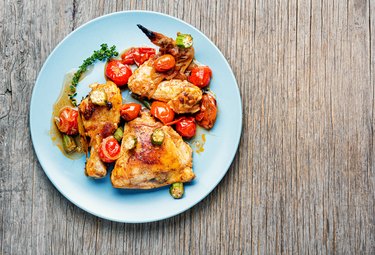
You might purchase chicken thighs to save a few dollars per pound over breast meat, or because you prefer the richer flavor and tender texture. If you regularly add this cut of meat to meals, you may wonder about chicken thighs' calories, and how they compare to other cuts of meat.
Tip
Baked, or roasted, chicken thighs contain 150 to 200 calories per 3-ounce serving, depending on whether or not you include the skin.
Video of the Day
Chicken Thigh Calories
A 3-ounce serving of chicken thighs roasted, with the skin, contains 197 calories, 20 grams of protein and 12.5 grams of fat. Remove the outer skin and eat 3 ounces of meat only to save 45 calories and 5 grams of fat; skinless thigh servings have 152 calories, 21 grams of protein and 7 grams of fat.
Two grams of that fat is the undesirable saturated type, but the rest is the healthier unsaturated type. In general, poultry skin raises the fat content of a piece of meat by 25 to 35 percent.
Video of the Day
Food and Nutrition Research published a paper in June 2015, stating that chicken fat has a favorable composition, masking it a desirable fat for consumption. Fed mainly a vegetable-derived diet, chickens produce a meat rich in alpha linolenic acid — a precursor to essential omega 3 fats. Consumption of some fat is essential to nutrient absorption, brain health, and supple hair and skin.
A 3-ounce serving of chicken thighs also contains 0.96 of the 8 (males) to 18 (females) milligrams of the mineral iron recommended for adults daily. The same serving provides 229 milligrams of potassium; an adult male should aim for 3,400 milligrams daily, and a female, 2,600.
Read more: Symptoms of Potassium Overdose
Chicken thigh meat is darker and richer-tasting because it contains more myoglobin. This is a protein that binds to and transports oxygen to working muscles. Since the thigh is a lot more active than the breast, it has more of this protein.
Compare to Chicken Breasts
The calorie and macronutrient contents of thighs to breast meat are readily comparable. Chicken breasts' nutrition profile differs slightly from that of thighs. A 3-ounce portion of roasted chicken breast with no skin contains 139 calories, 26 grams of protein and 3 grams of fat; keep the skin on for 165 calories, 25 grams of protein and 6.5 grams of fat.
Despite the calorie and nutrient differences, both chicken thighs and breasts are considered a lean protein, according to the Academy of Nutrition and Dietetics. Lean proteins are considered more heart-healthy, as they may help you maintain healthy cholesterol and blood pressure levels, the organization explains. Other lean proteins include fish and shellfish, tofu and low-fat dairy.
Consumption of any type of chicken meat adds to a balanced diet, explains the paper in Food and Nutrition Research. Adequate consumption of chicken helps control body weight, and has potentially positive effects on the risk of developing many chronic diseases, including cardiovascular disease, diabetes and cancer.
Preparation Matters for Calorie Count
The Academy of Nutrition and Dietetics also explains that the way your chicken thighs are cooked does matter. Baking doesn't usually involve adding extra fat or calories, just seasonings. This is why the American Heart Association lists it as a healthy way to prepare meats, including chicken. Grilling is another healthy way to cook chicken and minimize chicken thigh calories. But, if you stew, fry or bread the thighs, you'll raise the calorie count.
Read more: How to Bake a Plain Chicken Breast
If you like how chicken skin keeps thigh meat moist, keep it on while the parts are cooking — just remove it before eating to save calories and extra saturated fat.
Also check the nutrient label of the chicken you purchase. Some manufacturers inject chicken (and other poultry) with salt to help it stay moist. This, however, could be an issue if you're trying to manage your sodium intake.
- Academy of Nutrition and Dietetics: "Breasts vs Thighs Which is More Nutritious?"
- USDA Nutrient Database: "Chicken, Broilers or Fryers, Thigh, Meat and Skin, Cooked, Roasted"
- USDA Nutrient Database: "Chicken, Broilers or Fryers, Thigh, Meat Only, Roasted"
- USDA Nutrient Database: "Chicken, Broilers or Fryers, Breast, Meat Only, Cooked, Roasted"
- USDA Database: "Chicken, Broilers or Fryers, Breast, Meat and Skin, Cooked, Roasted"
- American Heart Association: " Meat POultry and Fish: Picking Healthy Proteins"
- Food and Nutrition Research: "Role of Poultry Meat in a Balanced Diet Aimed at Maintaining Health and Wellbeing: An Italian Consensus Document"
- Office of Dietary Supplements: "Iron"
- Office of Dietary Supplements: "Potassium"
- Academy of Nutrition and Dietetics: "How Much Protein Should I Eat?"